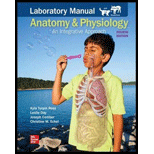
_____ 1. The female homologue to the glans of the penis is/are the
- a. labia majora.
- b. labia minora.
- c. clitoris.
- d. vagina.
Introduction:
The reproductive system is comprised of all the sex organs of an organism. The sex organs work in coordination to carry out the sexual reproduction.
Answer to Problem 1DYKB
Correct answer:
The glans penis is homologous to the clitoris. Therefore, option c. is correct.
Explanation of Solution
Reason for the correct statement:
Option c. is given as “clitoris”. The clitoris is homologous to the penis and is formed of two erectile folds known as corpora cavernosa. It receives several nervous and vascular supplies. Both the glans penis and clitoris are comprised of corpora cavernosa.
Hence, option c. is correct.
Reasons for incorrect statements:
Option a. is given as “labia majora”. Labia majora is homologous to the scrotum and is paired covered with pubic hairs on its outer surface. Hence, option a. is incorrect.
Option b. is given as “labia minora”. Labia minora are paired folds of areolar connective tissue, which contain sebaceous glands. It is not homologous to the glans penis. Hence, option b. is incorrect.
Option d. is given as “vagina”. The vagina is fibromuscular tube and is thick-walled. It forms the inferior-most region of the female reproductive tract. It is not homologous to the glans penis. Hence, option d. is incorrect.
Hence, options a., b., and d. are incorrect.
The glans penis is homologous to the clitoris as both the glans penis and clitoris are comprised of the fold of erectile tissue known as corpora cavernosa.
Want to see more full solutions like this?
Chapter 28 Solutions
ANATOMY+PHYS.LAB.MANUAL,MAIN VERSION
- How is a protein destined for the Endoplasmic Reticulum (ER), imported into the ER? Be concise.arrow_forwardFind out about the organisations and the movements aimed at the conservation of our natural resources. Eg Chipko movement and Greenpeace. Make a project report on such an organisation.arrow_forwardWhat are biofertilizers and mention the significancearrow_forward
- PCBs and River Otters: Otters in Washington State’s Green-Duwamish River have high levels of polychlorinated biphenyls (PCBs) in their livers. PCBs can bind to the estrogen receptors in animals and disrupt the endocrine system of these otters. The PCBs seem to increase the estrogen to androgen ratio, skewing the ratio toward too much estrogen. How would increased estrogen affect the river otter population? Based on your reading of the materials in this unit, what factors can affect fertility in humans? Explain how each of the factors affecting human fertility that you described can disrupt the human endocrine system to affect reproduction.arrow_forwardOther than oil and alcohol, are there other liquids you could compare to water (that are liquid at room temperature)? How is water unique compared to these other liquids? What follow-up experiment would you like to do, and how would you relate it to your life?arrow_forwardSelection of Traits What adaptations do scavengers have for locating and feeding on prey? What adaptations do predators have for capturing and consuming prey?arrow_forward
- Competition Between Species What natural processes limit populations from growing too large? What are some resources organisms can compete over in their natural habitat?arrow_forwardSpecies Interactions Explain how predators, prey and scavengers interact. Explain whether predators and scavengers are necessary or beneficial for an ecosystem.arrow_forwardmagine that you are conducting research on fruit type and seed dispersal. You submitted a paper to a peer-reviewed journal that addresses the factors that impact fruit type and seed dispersal mechanisms in plants of Central America. The editor of the journal communicates that your paper may be published if you make ‘minor revisions’ to the document. Describe two characteristics that you would expect in seeds that are dispersed by the wind. Contrast this with what you would expect for seeds that are gathered, buried or eaten by animals, and explain why they are different. (Editor’s note: Providing this information in your discussion will help readers to consider the significance of the research).arrow_forward
 Medical Terminology for Health Professions, Spira...Health & NutritionISBN:9781305634350Author:Ann Ehrlich, Carol L. Schroeder, Laura Ehrlich, Katrina A. SchroederPublisher:Cengage Learning
Medical Terminology for Health Professions, Spira...Health & NutritionISBN:9781305634350Author:Ann Ehrlich, Carol L. Schroeder, Laura Ehrlich, Katrina A. SchroederPublisher:Cengage Learning- Essentials of Pharmacology for Health ProfessionsNursingISBN:9781305441620Author:WOODROWPublisher:Cengage
 Human Physiology: From Cells to Systems (MindTap ...BiologyISBN:9781285866932Author:Lauralee SherwoodPublisher:Cengage Learning
Human Physiology: From Cells to Systems (MindTap ...BiologyISBN:9781285866932Author:Lauralee SherwoodPublisher:Cengage Learning





